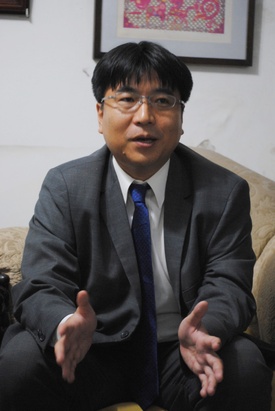Are there no Japanese people working in Japanese convenience stores?
[Nagai] If you look at the statistics on foreigners in Japan, you can see that when I came to Brazil from Japan, there were about 100,000 Vietnamese people. But in the last three years, that number has increased to 260,000. That's an increase of 160,000. So when I talk to people who have returned to Japan temporarily, they say, "Even when I go to a convenience store in Japan, there's not a single Japanese person working there."
[Shimano] He's Chinese.
[Nagai] A Chinese person and a Vietnamese person.
[Shimano] India, for example.
[Nagai] I think they are from India or Nepal. That's why the numbers are increasing so much. It's becoming an immigrant society, more and more.
Recently, there was a newspaper report saying that the population would be increased by about 500,000 by 2025, but even without any new declaration, the population has already increased by 160,000 over the past three years.
The number of people coming from Vietnam is increasing little by little every year, and the period of stay was originally three years, so it was expected that people would start returning around this year, but it was changed to five years. Well, it first went from three years to five years, and then from five years to ten years. I don't think there will be anyone who returns after 10 years.
Actually, many people can't go back because even if they go back after living there for 10 years, their relationships have changed drastically.
[Fukazawa] They're lowering the bar for entry for the fourth generation of Japanese, but the entry restrictions are strangely strict. Maybe they'll review it in a few years and relax it, or whatever. I'm not sure.
[Nagai] As for fourth-generation Japanese-Americans, I think there were some opinions that they should be given the same "permanent resident" status as third-generation Japanese-Americans.
[Fukazawa] In a way, that is the ideal for fourth-generation immigrants too. But I was really grateful when Representative Shimoji spoke passionately about how "There were a lot of problems with visas for the third generation and up. That's why we made changes to the fourth-generation visa to prevent that from happening again," and "Because we want to welcome them with care."
That is because I think there are contradictions on the Japanese community side as well. We at Japanese-language newspapers have endlessly made various complaints about the current system for the third generation, saying things like, "It has these flaws," "It's a shame they are exploited by dispatch companies," and "It has resulted in tens of thousands of semi-lingual generations who cannot read or write properly in either Japanese or Portuguese. First we need to solve the educational problems of Japanese children in Japan, then we can have a new system."
When the Japanese government started to take these things into consideration and "deal with them politely," the Japanese representative organization started to say, "Make it the same as the system for the third generation!" (laughs)
It's not like "anyone can go to Japan to work." It would be the worst if the same problems as the third generation happened to the fourth generation, actually. In that sense, they may be asking the Japanese government for a generous response like "I want the conditions to be easier, but I also want them to be very generous."
Characteristics of Brazilians living abroad
[Nagai] However, there are many Japanese people in Japan who don't want to let too many foreigners in. Some people still have bad memories of the time when the Brazilian population increased dramatically and crime increased dramatically around 2006.
On the other hand, even among those who want to come, if they are free to change jobs like "permanent residents," they will not be able to settle in the workplace they want. Therefore, some people think that it would be better if they could work cheaply and stably, like technical intern trainees who cannot change workplaces.
I feel like all these different intentions got mixed up together and that's how we ended up with the current system.
[Fukazawa] People often argue that Japan needs to bring in foreigners because its population is declining.
[Nagai] Yes.
[Fukazawa] If that's the case, I think we need to accept them with the same treatment as Japanese people. If we accept foreigners as if they are only for low-level labor, they will be resentful in the future, and when the time comes for Brazilians in Japan to celebrate the 100th anniversary of their immigration, they will likely say, "We were discriminated against by the Japanese government when we immigrated."
Also, it would be terrible if the Japanese newspapers started reporting things like "10,000 Japanese disappear every year." Well, if it was that bad, I probably wouldn't go there any time soon.
There is definitely a sense of obvious superiority of the Japanese, and I think that in a global society, it's something we can't be proud of.
[Nagai] Not only that, but if society becomes too divided into classes, there will be an increase in crime and various other problems will arise.
[Fukazawa] So I think we should use the acceptance of Japanese people as a test case. If we accept Japanese people well and they become second-generation residents of Japan, I feel that their mentality will become "almost Japanese."
[Shimano] Not people who have naturalized, but probably from the next generation, probably.
[Fukazawa] That's right. In June, there was a press conference for film director Chizu Kaoru Yamazaki, and Jiretora from the State Immigration History Museum was sitting next to her and they were talking together. Jiretora said something interesting. "Even after 100 or 110 years, Japanese Brazilians are still trying hard to preserve the traditions of Japanese culture, but when Brazilians go to America or Europe, their children already become part of that country. They blend in without any resistance." Or rather, she said something like, "That's the characteristic of Brazilians."
"I see," I thought. Because it is a new immigrant nation, it is racially diverse and its national character is not yet solidified. Therefore, if you immigrate to another country, it is easy to adapt.
Continued >>
*This article is reprinted from the Nikkei Shimbun (August 30th and 31st , 2018 ).
© 2018 Masayuki Fukasawa / Nikkey Shimbun







